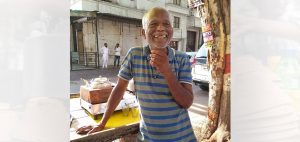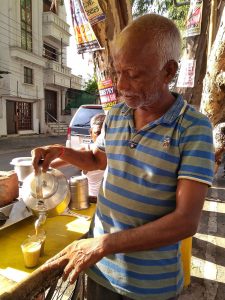People of Bharat: Shankar Yadav, Lucknow

In the blistering afternoon heat of Lucknow, a handcart stands sheltered under a tree. The handcart supports a two-burner stove, attached to a gas cylinder balanced on the pavement. On the stove is a tin kettle, a vessel of milk and half a dozen glasses. This small set-up belongs to Shankar Yadav, who has stood at this spot, making and selling tea for the past 20 years.

Shankar Yadav is 55 years old. Petite of stature, he is brown-skinned and his yellowing teeth point towards an excessive intake of tobacco. He is almost completely bald but sports a child-like grin as he talks to me.
Shankar was born in Nawabpoora, Lucknow. His father worked for the District Panchayat and his mother was a homemaker. Shankar was the eldest of eight children — he had two brothers and five sisters. Shankar’s younger brothers succumbed to Hemophilia, a sex-linked genetic disease. He says, ‘I don’t know whether I am lucky or not to survive. It wasn’t easy marrying off all my sisters’. He lowers his voice as the pain of losing his younger siblings comes back to his memory. ‘Duniya ka sabse bada dukh kya hai?’ (What is the deepest sorrow on earth?) he asks me and answers at once, ‘Sabse bada dukh tabh hota hai jab ek baccha uske ma-baap ke saamne khatam ho jaata hai’ (The deepest sorrow for parents is to helplessly watch their child die). He reminisces how he saw his father struggle to feed his family. Shankar has completed his secondary education.
Shankar lives in the house where he was raised, now with his wife aged 45 and their four children. He inherited it after his father who also passed away. The house is a semi-pucca construction and consists of two rooms. His eldest son is 19 and mentally challenged. He never went to school and does not work. His second son has passed his tenth standard exams and sometimes helps him out at the stall making tea. His daughter is currently studying in the tenth standard while his fourth son is still in kindergarten. The family has a gas connection and a bicycle as their worldly possessions.
Shankar earns Rs. 2000 per month making and selling tea. His daily costs are Rs. 70–80 which accounts for two liters of milk, tea leaves and sugar. He spends Rs. 3–4000 on monthly groceries, another Rs. 200–300 on utilities. He tells me his wife has recurring health issues and he needs to spend Rs. 500–600 per month on medicines. I ask him if he has consulted a doctor for her condition– he answers he has no money to pay the doctor’s fees. He gets medicines from the local pharmacy after describing her symptoms. ‘Jo dawai dede wahi doctor hai hamare liye’ (The one who gives us medicines is like a doctor to us), he elaborates. Shankar manages to save Rs. 100–200 which he promptly puts away in his bank account. He has no gold, no vehicle, and no insurance — his life savings amount to Rs. 5–6000.
Every morning Shankar leaves his house at 6 AM and cycles to his work spot. Here he cleans the cart and lights an incense stick to the rising sun. For Shankar the sun is the only predictable force in his life; it rises and sets in a constant and steadfast pattern. ‘Aap logon ka vigyan nahi maanega, par hamare liye toh dharti ruki hai aur suraj chalta hai. Dekhiye hum yahi rukein hain aur hamare saamne se suraj upar hota hai aur peeche hojata hai.’ (Your science won’t agree, but for us, the earth is stationary, and it’s the sun that moves around it. Look, I stay here all day and I see the sun rise, get over my head, and then set behind me.) Drawing a semi-circle in the air, he traces out the celestial path of the sun with his hands.
Shankar has seen many changes in the area since he first set up his handcart 20 years ago. ‘There was nothing here when I came,’ he says, ‘only that restaurant over there,’ pointing to a small eatery. Another change is looming ahead; one that threatens to destroy his very means of livelihood. I learn from him that according to a revised Nagar Nigam plan in Lucknow, all street hawkers, peddlers and stall owners are to be moved to a vending zone where they will be required to operate from. Forms for securing a spot in the upcoming vending zone were issued several weeks ago. ‘I filled that form too, but no one has come to inform me whether I have been allotted a space or not’ says Shankar.
Shankar fears he has not been considered for the vending zone and will soon have to stop selling tea on the streets. ‘Just a few more days and then the officials will come asking us to vacate’ he says wringing his hands in despair. He has no resources/means of following up with the officials over this. ‘Hum kalyug me rehte hai — ghooskhori ka zamana hai. Jisne paise diye honge unka naam list me aayega’ (We live in evil times — corruption is the trend. Whosoever must have paid money must have got his name on the list), he adds. In this way he assigns some meaning to his helplessness. I ask him about his plans if the worst were to happen. ‘Mazdoori karenge’ (I will find labor work), he says at once. ‘Daily niklenge bahar kaam dhoodhne. Daily ka kamaenge. Bachon ke liye karna hi hoga.’ (I will search for work on a daily basis. Will earn on a daily basis. I will have to for the sake of the children.)
Shankar’s daughter studies at a school where she gets free education. He hopes this will help her to complete her 12th standard. He has hopes for her since she is of a studious kind. ‘I have never stopped my daughter from studying. I see my future getting fulfilled through her’.
I ask him if he owns a smartphone. In reply, he fishes out a feature phone from his cash box. He tells me he charges it at his neighbour’s house.
I ask Shankar about his financial aspirations. ‘Yahan sab kotihiyan aur gadiyan dekhta hun to bahut mann hota hai ki ek choti si kothi ban jaye magar main to sochne me hi khatam ho jaunga’ (When I look at the houses and cars here, I wish I had a larger house — but I know I will die still thinking about it) he says. ‘Whatever time is left to me, I would like to see my kids settled’ he adds.
As I thank him for his time and fold up my notes, he entreats me to stay. ‘No one comes and talks to me like this, please stay and chat for a while. Will you communicate our troubles to people at the top? Will there be any change?’ he gushes. And I have no clear answers.
This research was developed as part of the Bharat Inclusion Initiative.
